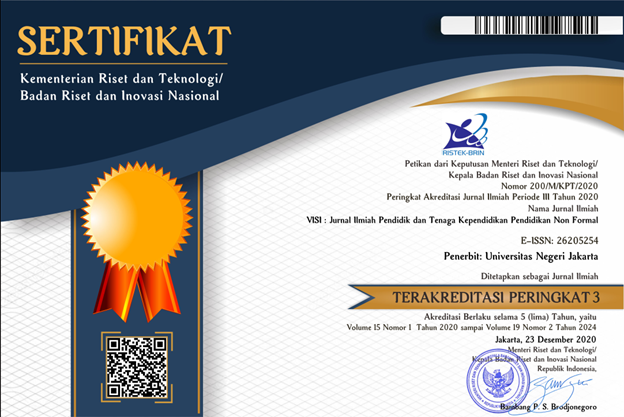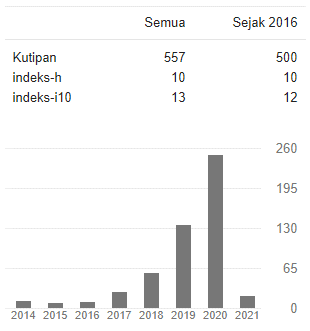ANALISIS KONSEP DIRI MAHASISWA PROGRAM STUDI PG-PAUD
DOI:
https://doi.org/10.21009/JIV.0902.2Keywords:
The concept of self, rational thinking, program Early Childhood EducationAbstract
The general objective of this study was to obtain information about the concept of self-Student Program Early Childhood Education FKIP UNTAN. The method used in this research is descriptive method. Data collection techniques used are indirect communication techniques by using a questionnaire (questionnaire). Data were analyzed using descriptive statistics percentage. Based on the analysis of questionnaires on self-concept of early childhood education students can be described as follows: (1) Be Objective In Yourself, 72.50% obtained results with either category, (2) Respect Yourself, results obtained 65.62% with either category, (3) Not hostile Yourself, 69.37% obtained results with both categories; (4) Rational Thinking, the results obtained 78.12% with very good category. Based on the findings it can be concluded that: (1) Was able to assess themselves objectively, (2) Can respect himself, (3) Did not antagonize the aspects themselves well categorized. This shows that they are always optimistic when facing a failure, and not feeling sorry for themselves or even blame themselves which can result from frustration; (4) Has a way of rational thinking. This shows that they are not susceptible to things that are less accountable.
Downloads
Published
How to Cite
Issue
Section
License
Authors who publish with this Journal agree to the following terms:
- Author retain copyright and grant the journal right of first publication with the work simultaneously licensed under a creative commons attribution licensethat allow others to share the work within an acknowledgement of the work’s authorship and initial publication of this journal.
- Authors are able to enter into separate, additional contractual arrangementfor the non-exclusive distribution of the journal’s published version of the work (e.g. acknowledgement of its initial publication in this journal).
- Authors are permitted and encouraged to post their work online(e.g. in institutional repositories or on their websites) prior to and during the submission process, as it can lead to productive exchanges, as well as earlier and greater citation of published works.
- Users/public use of this website will be licensed to CC BY-NC-SA Creative Commons Attribution-NonCommercial-ShareAlike 4.0 International License









